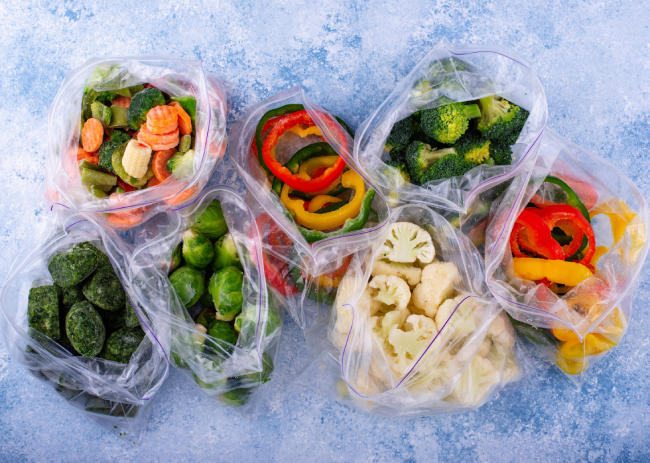Food storage is not a new thing. Just by the many different types of pantries and fridge inventions, you can see how important storing your food is. In this article, we are going to discover how to store food correctly, and the ways to deal with your staples, baked goods and fresh food items. You will also see how to handle packaged foods and mixes.
Storing Your Staples.
Food storage for most of your staples is not that hard. You can store them in cool cabinets and cupboards. They should be kept away from any appliances that produce a lot of heat. Most of your canned goods and staples have a longer shelf life. But, you should only buy what you think you will use in that period of time. You can label your food according to how long they take to expire. Also, make sure you purchase fresh packages. Stay away from anything dusty or old looking, including bulging and dented cans.
For items like baking powder, baking soda, bouillon cubes and breadcrumbs you should cover them and keep them dry. For opened cereal, you should refold the packet and consume it within 2-3 months. If it is unopened you should first check the date and then you can store it from 6-12 months from manufacture. Besides that, your chocolates can be kept cool in the fridge while your chocolate syrups and cocoa mixes should be covered tight and refrigerated as per instructions. You can sore plain cocoa for an indefinite amount of time.
In the case of coffee, you should refrigerate it after you open it. Keep these boxes closed and always use a dry spoon. For things like cornmeal and cornstarch, you should keep them covered tight. These can be stored for 12 months and 18 months respectively. In addition, mayonnaise should be kept in the fridge after opening. You can store it for 2 to 3 months. Pasta should be kept in an airtight container after opening. You can also store your rice (white, brown, flavoured or wild) in a tight lid contained. Sugar and tea can be stored in airtight containers as well. Vegetable oil can be stored in a cool and dark place in a tight-lid container.
Refrigerating or Freezing Your Baked Goods.
Food storage for baked goods like unbaked rolls and bread can go in a fridge for 2-3 weeks or up to a month in the freezer. If you store it for too long the gluten weakens and the yeast is inactivated. Half-baked cinnamon rolls, baked quick breads and frosted or unfrosted baked cakes can be frozen for 2 months. Also, unbaked cakes, waffles and pumpkin or chiffon pies can be frozen for 1 to 2 months.
Besides that, your angel cakes, fruit cakes, baked cookies and baked muffins can last for up to 6 to 12 months in the freezer. Also, your biscuits, rolls, pastries and cookie dough can be stored according to the expiration date on the label.
Freezing Your Dairy.
For food like butter, margarine, egg whites or yolks can be stored in the freezer for up to 12 months. You should cover your eggs and store them in a container. Your butter and margarine can be covered or wrapped tightly. Cheese like ricotta can be frozen for 4 weeks or in the fridge for a week. Gourda, Swiss or Brick can last up to 8 months in the freezer or 3 months in the fridge. You should keep the cheese in tight packages wrapped in moisture-resistant packing.
For storing your dips you can put them in the fridge for 2 weeks (commercial) or 2 days (homemade). You should cover them tight. Food storage for milk is pretty basic. Keep them covered or in containers to prevent spoiling. You can store milk for around 4-5 days in the fridge. Yogurt can be refrigerated for 7 to 10 days and kept covered. You should always follow the instructions on the carton itself.
Storing Fruits, Vegetables And Other Fresh Food.
You can store fruits like apples, apricots, avocados, berries, cherries, cranberries, guavas and mangos for 8 to 12 months in the freezer. The average storage of these fruits is 3 to 7 days. For pre-mixed or full-strength juices you can store them in the fridge for 6 days or 8 months in the freezer. Don’t store them in cans but decant them into a glass or plastic container. Real lemon juice lasts for around 12 months in the freezer.
Vegetables like artichokes, asparagus, eggplant, mushrooms, parsley and tomatoes can be stored for around 2-3 days in the fridge. Some of them even stay up to 12 months in the freezer. Besides that, you can also store your carrots, beets, and radishes in the fridge for 2 weeks. Make sure you store your lettuce heads in moisture-resistant wraps. Keep them away from other vegetables. You should refrain from washing your mushrooms before storing them. Also, veggies like radishes and artichokes don’t freeze well. Finally, keep your corn in husks moist.
Food storage for uncooked meats, poultry and fish is next on the list. For your red meats like chops, ground meat and stew meat, you can store them in the freezer for around 3 to 4 months. This also applies to certain poultry like duck or goose. You can store meat, fish and poultry in the same plastic wrapping that you buy from self-service counters. Besides that, you can refrigerate your fat and lean fish fillets and steaks for around 36 hours. Besides that, you can store most shellfish and smoked fish for 5-6 days in the fridge.
Dealing With Your Packaged And Mixed Food.
Food storage for mixes and packaged foods is up next. You can store your biscuit, brownie and muffin mixes for 9 months in a cool and dry area. Besides that, your cake mixes can also go for 9 months. If they have buttercream, whipped cream or fillings of any kind, you can store them in the fridge. Other than that, you can store your powdered drink mixes, hot roll mixes and entrees for around 18 months. Keep them in cool, dry and airtight packages. Sauce and gravy mixes can last up to 12 months in a cool and dry space.
In Conclusion
Food storage is not as complicated as it sounds. Most food has all of this information on the packaging itself. Besides that, you can understand how to deal with packaged and mixed food.
Storing food properly is important for them to last long. It is a small way for you to change the way you consume food. It also reduces the amount of food your waste.
What kinds of tips do you use while storing food? How did this article help you? Let us know in the comments below.
Danielle is a content writer with a love for books, music, and lifestyle blogs.

